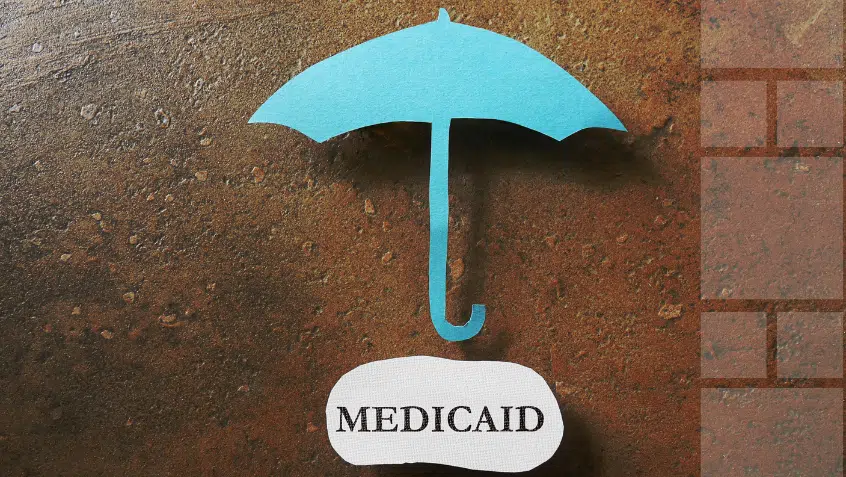Join Us Live for a Discussion on Medicare, Democracy, and the Future of Health Care
Medicaid Cuts at the State Level and Implementation Advocacy

With the reconciliation bill now law, stakeholders and advocates are eyeing the implementation process and what it might mean at the state level.
A new resource from Manatt Health offers state-specific estimates on Medicaid coverage and hospital expenditures, as well as congressional district–level data. The authors estimate nearly 9 million people will lose Medicaid, which “translates into one in 10 people currently enrolled in the Medicaid program nationwide losing their coverage.” They find that over the next ten years, total Medicaid cuts (federal and state funds) will reach more than $1.2 trillion and hospitals will lose 18% of their Medicaid funding.
Hospitals will lose 18% of their Medicaid funding.
Similarly, a KFF analysis on the state level impacts finds federal Medicaid spending alone will fall by $1 trillion over ten years, representing 15% of federal spending on Medicaid over that period. The spending cuts vary by state; Louisiana and Virginia are the most heavily affected, with 21% reductions. Over half of the bill’s Medicaid cuts come from policies that target ACA expansion states, such as the work reporting requirement ($326 billion) and more frequent eligibility redeterminations ($63 billion).
Expansion States, Rural Areas Will Be Hit Hardest
Expansion states with large numbers of rural residents will be hit the hardest. A separate KFF analysis notes Medicaid covers 1 in 4 adults in rural areas, a higher share than in urban areas, and plays a large part in financing rural health care services. The analysis projects rural states will lose $155 billion in federal Medicaid funding under the bill, far more than the $50 billion rural health fund lawmakers added at the last minute.
Indeed, those reductions are largely concentrated among 12 states that have large rural populations and expanded Medicaid. Kentucky, North Carolina, Virginia, Illinois, New York, Ohio, Pennsylvania, Michigan, Oklahoma, Missouri, Minnesota, and Louisiana could each lose $5 billion or more.
Twelve states that have large rural populations and expanded Medicaid … could each lose $5 billion or more.
But everyone will feel the impact. Many other harmful Medicaid changes apply broadly, such as the provision halting the simplification of Medicaid eligibility and renewal processes ($167 billion) and new restrictions on state financing options ($340 billion). Overall, seismic shifts are expected throughout the entire health care system, driving up costs and reducing access to care nationwide.
Advocacy Can Shape How the Law is Implemented
The extent of these challenges will become clearer when the law is implemented. For example, it remains to be seen how states will respond to the Medicaid changes and how much control federal agencies will exercise regarding state choices.
There will be opportunities to weigh in as states work to stand up to these new requirements and to help shape their roll out at the federal level.
Because so much is still to be decided, engagement and advocacy remain critical. There will be opportunities to weigh in as states work to stand up to these new requirements and to help shape their roll out at the federal level. Throughout, Medicare Rights will remain steadfast in our commitment to holding policymakers accountable, to mitigating and reversing the bill’s harms, and to championing policies that advance health, well-being, and dignity.
Further Reading
Manatt Health: Impact to State Medicaid Coverage and Expenditures, Hospital Expenditures, Including Impacts by Congressional District.
KFF: How Might Federal Medicaid Cuts in the Senate-Passed Reconciliation Bill Affect Rural Areas?
Show Comments
We welcome thoughtful, respectful discussion on our website. To maintain a safe and constructive environment, comments that include profanity or violent, threatening language will be hidden. We may ban commentors who repeatedly cross these guidelines.
Help Us Protect & Strengthen Medicare
Donate today and make a lasting impact
More than 67 million people rely on Medicare—but many still face barriers to the care they need. With your support, we provide free, unbiased help to people navigating Medicare and work across the country with federal and state advocates to protect Medicare’s future and address the needs of those it serves.
The Latest
Most Read
Add Medicare to Your Inbox
Sign up to receive Medicare news, policy developments, and other useful updates from the Medicare Rights.
View this profile on InstagramMedicare Rights Center (@medicarerights) • Instagram photos and videos










3 Comments on “Medicaid Cuts at the State Level and Implementation Advocacy”
Cat
July 12, 2025 at 1:46 amI would like to know what percentage of people losing Medicaid are undocumented immigrants?
Cat
July 12, 2025 at 1:47 amWhat percentage of people losing Medicaid are undocumented immigrants?
Medicare Rights Center
July 14, 2025 at 1:25 pmThanks so much for reading. To clarify, the percentage of people losing federally funded Medicaid who are undocumented immigrants is zero. Undocumented immigrants were never eligible for federally funded Medicaid, even before this legislation.
It’s true that some states have chosen to use their own funds to expand health care access to certain undocumented populations, but these programs are entirely state-funded and separate from federal Medicaid dollars.
You may have also heard about Emergency Medicaid. This is a very limited program that covers care hospitals are legally required to provide during serious medical emergencies, regardless of a person’s immigration status. In FY 2023, Emergency Medicaid made up just 0.4% of total Medicaid spending. It’s designed to help hospitals recoup costs for care they must provide, not to offer ongoing coverage or access to broader Medicaid services.
If you’re interested in learning more, I recommend checking out these briefs. Thank you for your engagement on this important topic.
https://www.kff.org/racial-equity-and-health-policy/issue-brief/5-key-facts-about-immigrants-and-medicaid/
https://www.kff.org/racial-equity-and-health-policy/issue-brief/state-health-coverage-for-immigrants-and-implications-for-health-coverage-and-care/